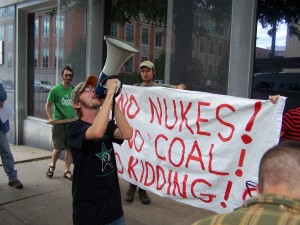Richmond, Virginia’s finest were truly in fine form yesterday – demonstrating that the heartland of coal and nuclear power remains attentive to the corporate security threat of climate justice activism.

Significantly outnumbering the ranks of Rising Tide, Earth First, Mountain Justice and RAN activists, the coalition forces of the Richmond area police departments, state troopers, county sheriff offices and numerous federal law enforcement officials assumed total control of the city, attempting to protect business as usual in the wake of public protest.
The Southeast Climate Action Camp held in Louisa County, Virginia, had just provided a week full of training and strategizing (the downfall of various fossil fuel empires) and activists from throughout the US Southeast planned and prepared to take on some of the key corporations responsible for climate change in Virginia – they were ready for a good day of action.
Virginia-based utility company – Dominion had received significant attention from both coal and nuclear activists at the Climate Action camp, due to its prominent role in both these high risk energy sectors. With ten coal power and four nuclear power facilities in Virginia, Dominion has in recent years offended many residents of the state with plans to add to add more dirty power plants.
Launching plans in the early hours of the morning, the climate activists gathered at Dominion’s Innsbrook Technical Center – where the latest technologies in both coal and nuclear power generation are being developed. However, their elaborate plan of shutting down the expansive facility was foiled by well-placed police blockades and expansive ground and air surveillance. The activists quickly regrouped in the city – only to find that all access points to other corporate offices responsible for climate change – such as the headquarters of Massey Coal, Dominion and the Bank of America Center were being closely guarded. Not yet willing to admit defeat, the activists launched one last plan – a Rebel Clown Army march through downtown Richmond. Their perseverance paid off.

Alongside a substantial police escort, the activists weaved their way through Richmond streets – singing songs and chanting “No Coal, No Nuclear, No Compromise” – visiting the local coal and energy companies and the banks that finance them. Along the way – the office of the Department of Environmental Quality (DEQ) was given a finger wagging for “rubber-stamping” dirty coal permits.
Many residents and office workers – who do not often witness public dissent of this nature – greeted the activists with friendly words of encouragement and cheers. The march stopped at Massey Coal’s headquarters where Massey was told to “Keep your hands off our mountains”; then passed the DEQ and stopped at Dominion’s corporate offices where they were met by a line of the Richmond Mounted Police.
Finally the Rebel Clowns and friends marched to Bank of America’s business center where two activists locked themselves to the bank entrance with demands that BoA stop financing the coal companies that are destroying lives and communities in Appalachia and around the world.

After a couple of hours the bank blockaders were arrested and detained, and bank employees were able to return to work. Despite the obstruction of business hours, bank employees seemed more curious and interested in the action than disturbed. Richmond police were unavailable for comment on the fact that two of the activists had managed to slip by their elaborate defenses.
This day in Virginia wrapped up a couple of weeks of global climate activism – with action camps in the UK, Germany, Australia and North America preventing and obstructing business as usual operations at coal power plants, coal export ports and railroads, oil and gas pipelines, nuclear power plants and their corporate offices.

The multiple risks of nuclear energy first came into the public spotlight during massive public demonstrations in the 1970s, when 100s of nuclear power reactors were being planned for the US. The mass protests and direct actions of the 70s and 80s led to the shutting down of many proposed nuclear reactors (such as Seabrook 2) when public opposition forced the government to eliminate subsidies to the nuclear power industry – resulting in huge construction cost over-runs and the market realization that nuclear power was unaffordable for utilities and ratepayers
Today, the power sector faces similar questions regarding coal: can coal be cost competitive with existing renewable energy options when both direct and indirect subsidies (such as externalized health impact costs) are removed? With burgeoning construction expenses and a growing public demand that the coal power industry bear the costs of its impacts to communities on the frontlines of climate change, it appears that the anti-nuclear movement days are being re-enacted in this age of climate awareness. Young coal and climate activists at the Virginia Climate Camp had listened to stories from veteran anti-nuke activists about their days of mass direct action – and discussed what it might take to render the coal industry “economically obsolete”.
As the march wrapped up on the streets of Richmond in the late afternoon, and people arranged to have their friends released from police custody, some activists shouted “we’ll be back”. They will be back – the days of dirty energy are numbered.
